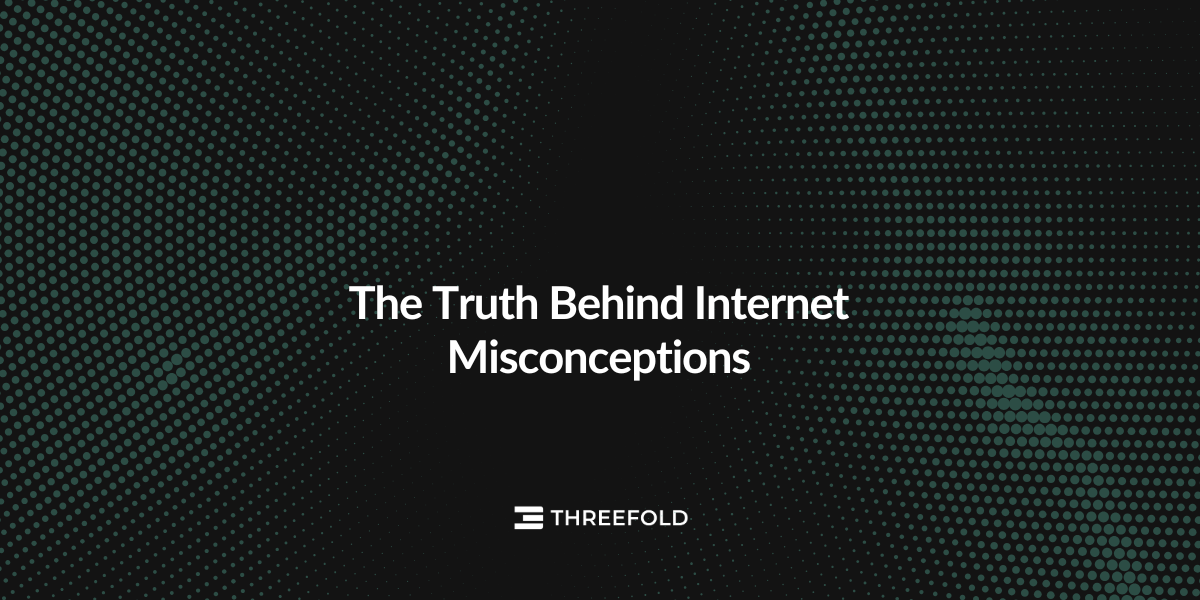The Truth Behind Internet Misconceptions
In an age where, for better or worse, our online interactions shape much of our daily lives, understanding the true nature of the Internet is more and more important.

It’s been years that the ThreeFold team has been at this work of evolving the Internet in a fair and just way. We know how the Internet works and the challenges it faces, and because of this, we have been able to do the work of upgrading the Internet with a ground-up solution.
But the Internet, despite its omnipresence and influence on our daily lives, is often taken for granted and mostly misunderstood. Here we’d like to present some of the common misunderstandings about the Internet and the actual realities behind them.
“The Internet is the same as the web.” Many people confuse the Internet with the World Wide Web. The Internet is the global network of interconnected computers, while the Web is just one of the services that runs on the Internet, allowing access to websites and web pages.
“The Internet is an infinite, vast, unified space.” While the internet is vast, it’s not infinite. There are boundaries, such as the “deep web” (content not indexed by search engines) and the “dark web” (encrypted networks), where different rules and content exist. It is a scattered network, not one entity.
“Data in the cloud doesn’t have a physical location.” There’s a common belief that data stored in the cloud is purely virtual. However, your data is stored in physical data centers around the world, occupying space and consuming energy to stay online.
“Putting information online has minimal environmental impact.” Many believe that digital activities, like uploading files or streaming, are environmentally neutral. In reality, these actions require energy-intensive data centers, and keeping our digital lives running contributes to significant carbon emissions.
“All websites are equally accessible.” Net neutrality is a key principle that has been challenged in recent years. Without it, Internet service providers (ISPs) could potentially prioritize or block access to certain websites, affecting the open nature of the Internet.
“The Internet is already decentralized.” While the Internet was originally designed as a decentralized network, much of it is now controlled by a few large corporations, leading to centralization of power and influence. Distributed and decentralized are different things, and even then, the Internet is not all that distributed.
“Everyone Has Access to the Internet.” While the Internet is widely available in many parts of the world, millions of people still lack reliable access due to economic, geographic, and infrastructural barriers. Digital inequality remains a significant global challenge, with rural areas and developing regions (particularly in the global south) often underserved.
“The Internet is free.” While many services on the Internet appear to be free, we often pay with our data. Companies collect and monetize personal information to offer “free” services, leading to privacy concerns. As the saying goes, “if it’s free, the product is you.”
“Online privacy is not a problem anymore.” Many people believe their online activities are private, especially when using “incognito mode” or similar features. In reality, much of what we do online is tracked, logged, and often shared with third parties – despite using privacy-enabling features.
“Well, I have nothing to hide, so privacy isn’t important anyway.” Many believe that if they aren’t doing anything wrong, they don’t need to worry about privacy. In reality, privacy is about controlling who has access to your personal information and how it’s used. Even seemingly harmless data can be collected, analyzed, and exploited in ways that affect your life, your choices, and your freedom.
“Everything on the Internet is true.” There’s a misconception that if something is online, it must be accurate or trustworthy. However, this is far from the truth. Misinformation, fake news, and unreliable sources are widespread, requiring critical thinking and fact-checking, and increasingly hard to differentiate from reality.
“The Internet is anonymous.” Many believe they can remain completely anonymous online, but in reality, most activities leave a digital footprint that can be traced back to the user with enough effort.
“Deleting something online makes it gone forever.” People often believe that deleting a post, message, or file online removes it permanently. However, copies or backups may still exist, and data can often be recovered or traced.
“Cybersecurity threats are overblown.” Some people underestimate the risks of online threats like hacking, phishing, and malware, assuming they won’t be targeted. However, the numbers are startling and everyone is vulnerable.
In an age where, for better or worse, our online interactions shape much of our daily lives, understanding the true nature of the Internet is more and more important. By recognizing misconceptions, we can better navigate the digital world. And the best part? ThreeFold has been working on a true solution to some of the Internet’s biggest challenges.
Dive in to learn more and how to get involved:

